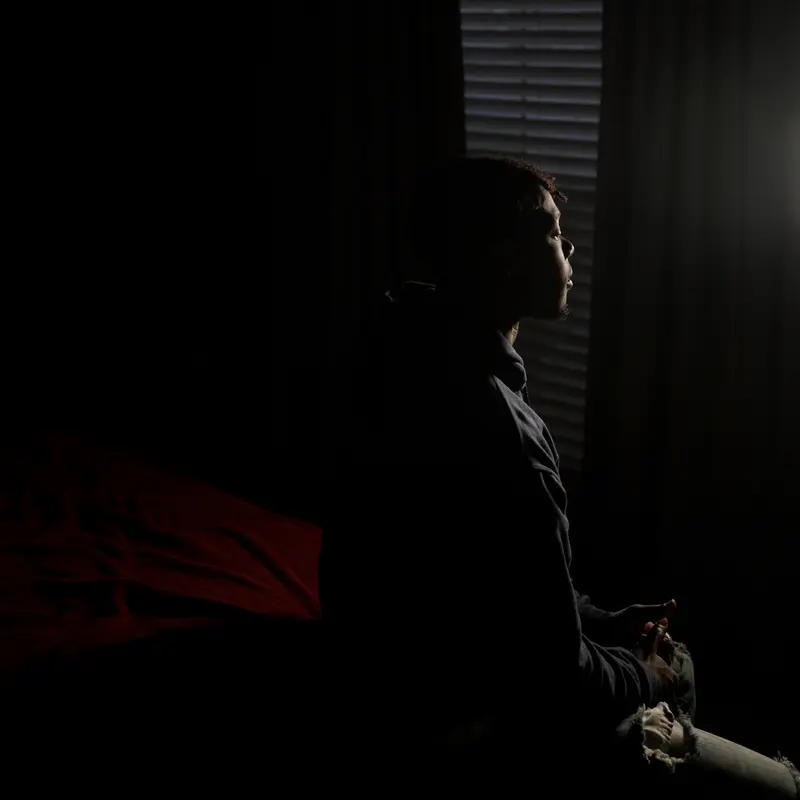This article was produced for ProPublica’s Local Reporting Network in partnership with WRKF and WWNO, and it was also co-published with The Times-Picayune/The New Orleans Advocate. Sign up for Dispatches to get stories like this one as soon as they are published.
Thousands packed the sidewalks along Veterans Memorial Boulevard in Jefferson Parish, Louisiana, watching the Krewe of Centurions Mardi Gras parade in March of 2019 when a brawl broke out at a nearby parking garage. More than two dozen men traded blows in a bloody melee that forced the parade’s 20-plus floats to grind to a halt.
Sheriff’s deputies quickly broke up the fight, arresting at least one man. As officers attempted to calm the crowd and shepherd them back to the parade route, Sgt. Keith Dowling claimed he saw someone hurling obscenities at his officers.
An “argumentative black male [was] agitating elements within the crowd by repeatedly yelling ‘Fuck You’ while gesturing with both middle fingers at responding deputies,” Dowling wrote in his incident report.
He identified the person in question as Jacobi Cage.
Cage’s presence at the parade is the only thing about that night that he and the officers agree on. Dowling, an eight-year veteran of the Jefferson Parish Sheriff’s Office, said he tried to de-escalate the situation by quietly removing Cage from the scene, but the then-20-year-old became violent and swung “wildly” at him, hitting him in the chest. The sergeant stated in his report he had no choice at that point but to use force to take Cage to the ground, after which he booked Cage for battery of an officer and resisting arrest.
After spending several hours in the parish jail, Cage was released with a summons to appear in court. He returned to his home that night feeling angry and helpless. Cage, who’d been a football standout at Destrehan High School in neighboring St. Charles Parish until his graduation two years earlier, had never been in legal trouble before, but now he was facing up to six months in jail and a criminal record.
He tried to tell his family he was innocent. He said the deputies attacked and beat him for no reason, then falsely arrested him. But it was his word against that of the Sheriff’s Office, and for a young Black man in Jefferson Parish, a majority-white, conservative community just outside of New Orleans, that was a losing hand.
As Cage lay in bed that night, unable to sleep, he scrolled through his Twitter feed and noticed a video that had been taken at the parade. The tweet said: “man just recording got assaulted and arrested for nothing.”
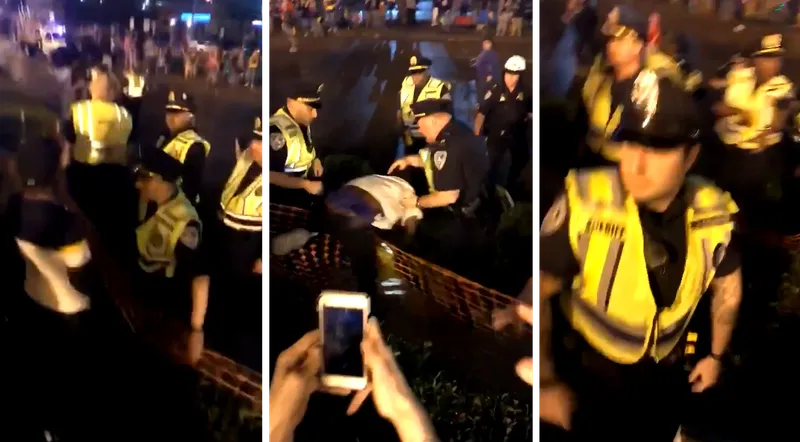
Cage hit play and said he began to cry, in both relief and shock, as he watched the 38-second clip, which has now been viewed more than 284,000 times.
The footage shows Cage standing on one side of an orange mesh barricade while two deputies are on the other, a few inches away, staring directly at him. Cage is holding his phone in his right hand, recording their interaction.
An unidentified deputy points at Cage, motioning for him to move away. Cage takes a few steps back. That’s when Detective Nicholas Broussard reaches across the mesh, smacks Cage’s phone out of his hand, then gives Cage the middle finger and walks away. In response, Cage holds up both middle fingers. Dowling responds by lunging at Cage, dragging him over the mesh barricade and slamming him headfirst into the ground.
Someone can be heard yelling repeatedly at the deputies, “That shit not right! That shit not right!”
“The police just grabbed me and started punching me,” Cage said. “I had a busted lip. My nose was crooked. I had a torn rotator cuff from football and they reinjured that. I felt like they were about to pull my arm off.”
At no point in the video does Cage become violent or swing at the deputies, though Dowling claimed in his report that the only reason he used force was that Cage had turned aggressive. Nor did the sergeant report that Broussard smacked Cage’s phone out of his hand. In fact, Broussard’s name is never mentioned in Dowling’s report at all.
“You always have your good cops, your bad cops,” Cage said. “I have no problem with the police. Even to this day. But what I seen that day was just wrong. Them charging me was just insane. It can happen anywhere, to anybody.”
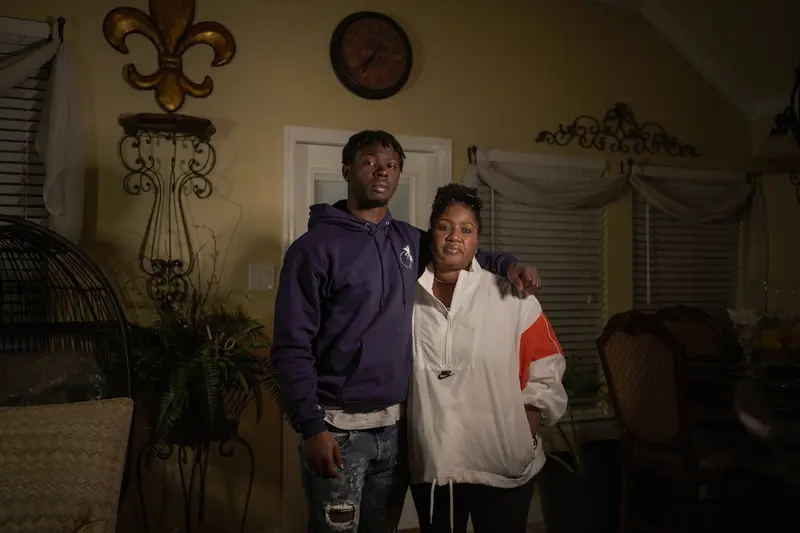
The charges Cage faced are known by police critics, defense attorneys and some federal investigators as “cover charges.” Deputies can use these offenses — typically resisting arrest, battery of an officer and flight from an officer — to arrest people they have assaulted, experts say. The charges, which are sometimes used in combination with other offenses, allow officers to cover up their use of excessive force and help shield the department from civil liability, according to civil rights attorneys. Because there is often no other evidence save for the word of the officer, and because the resisting arrest statute is written so broadly that it can be applied to almost any situation, convictions are relatively easy to secure. And once someone is convicted or enters a guilty plea, they often lose the right to sue for any alleged police brutality.
An investigation by WWNO/WRKF and ProPublica found that Black people are arrested in Jefferson Parish at a disproportionate rate overall — and arrested for cover charges at a still higher rate. The Black community accounts for 26% of the parish’s population and 57% of all arrests. But in cases where the arrest is based exclusively on cover charges, 73% of the time, the person is Black.
The Sheriff’s Office did not respond to a detailed list of questions and a request for comment. Attorney Danny Martiny, who represents the Sheriff’s Office and the deputies named in Cage’s lawsuit, declined to comment.
But Jefferson Parish Councilman Byron Lee, when presented with the findings, said, “It’s very disappointing, to say the least, that the Black community is targeted in the way the numbers suggest. And numbers don’t lie. It’s problematic in every way.”
The parish council doesn’t have any power over the sheriff, the way city councils often do over metropolitan police departments, so it is up to the voters to push for reform, said Lee, who believes the Sheriff’s Office “absolutely” needs to be reformed.
“There’s nobody I know who supports wanton discrimination,” he said.
U.S. Rep. Troy Carter, D-La., called the findings “concerning” and said that “criminal charges should never be used as tools for cover-ups.”
“Previous information alleging misconduct and missing accountability measures was disturbing,” Carter said of the news organizations’ earlier reports. “I am hopeful that the Sheriff’s Office will use all resources available to thoroughly and transparently seek out the truth, wherever it may lead. Ignoring a problem is never the answer.”
The cover charge tactic is not unique to Jefferson Parish. Over the past decade, the U.S. Department of Justice has noted the use of these charges in its investigations into law enforcement agencies accused of systemic misconduct and corruption in Chicago; Ferguson, Missouri; and New Orleans, among other places. These offenses are not only used to justify excessive force, but also as a threat to silence the alleged victims and potential witnesses, and to punish people who officers feel have disrespected them, according to DOJ investigators.
Determining whether an officer falsely arrested someone on cover charges can be difficult, but there are red flags, said Sam Walker, emeritus professor of criminal justice at the University of Nebraska Omaha. One is when an arrest involves only cover charges, with no other type of charge that would suggest what caused the police to try to detain someone in the first place. That is a “telltale sign of officer escalation and a strong indicator that the use of force was avoidable,” according to the Department of Justice’s 2015 report on the Ferguson Police Department.
Cover charges were also found to be used predominantly against Black people in the departments investigated by the DOJ, and the data shows that the same holds true in Jefferson Parish.
Prior to entering into a court-enforced reform agreement known as a federal consent decree, the Ferguson Police Department arrested Black people in cases where only cover charges were brought at a rate 1.4 times their share of the population. The New Orleans Police Department arrested Black people in cases where only cover charges were brought at a rate 1.6 times their share of the population. In Jefferson Parish, the rate was 2.8.
Neda Khoshkhoo and Caitlin Glass, law and policy fellows with the Boston University Center for Antiracist Research, said “the disproportionate pursuit of cover charges, and especially stand-alone cover charges, against Black people in Jefferson Parish raises red flags and calls for serious scrutiny.”
“Historically, these types of charges have been closely associated with racialized police violence,” they said in an emailed statement. “Concerns about potential fabrication of cover charges are so prevalent that some police departments and prosecutors’ offices in other parts of the country internally review ‘resisting arrest’ charges to screen for misconduct.”
This dynamic is all the more meaningful in Jefferson Parish, where for decades, members of the Black community have accused the Sheriff’s Office of using excessive force against them, making false arrests and failing to rein in abusive deputies. A previous investigation by WWNO/WRKF and ProPublica found that more than 70% of the people deputies shot at during the past eight years were Black, more than double the parish’s Black population. In addition, 12 of the 16 people who died after being shot or restrained by deputies during that time were Black men.
Cage’s attorney, Stephen Haedicke, said this pattern of discriminatory and abusive policing played out in his client’s case, which was also a textbook example of how departments hide officers’ wrongdoing.
“It’s just preposterous,” Haedicke said. “When you have supervisors apparently covering up for the misconduct of lower-ranking officers, it teaches a really bad lesson. It shows people how it’s done. And you got some bad apples who take those lessons to heart.”
In December 2015, a 14-year-old boy and his friend were playfully wrestling in a parking lot along Veterans Memorial Boulevard when a woman told them to leave or she would call the police. Moments later, an unmarked white Ford Explorer pulled up and Jefferson Parish Sgt. Julio Alvarado jumped out, gun drawn, and ordered the boys to drop their bikes, according to a lawsuit filed by the 14-year-old’s family. Alvarado then grabbed the child by the neck and slammed his head onto the concrete.
“Please don’t do this, my face hurts,” the boy pleaded as blood poured from his forehead, according to the lawsuit.
Afterward, the teenager was taken to a hospital, where he was treated for a neck injury, a black eye that had swollen shut, and abrasions to his forehead, cheek and nose, injuries the boy claimed were caused by the sergeant. Alvarado appeared in the boy’s hospital room, according to the lawsuit, and told him, “Use this as an example of what can happen.” Then the deputy booked him into the juvenile detention center for resisting an officer and battery on an officer, along with disturbing the peace and obstruction of a highway.
The Sheriff’s Office, which initially denied the allegations in court filings, settled the case for $15,000.
(ProPublica recently identified Alvarado as a deputy caught on video in September slamming a Black woman’s head repeatedly into the pavement with such force that several of her braids were ripped from her scalp. The Sheriff’s Office said it was investigating the incident, but as of Dec. 22, it has yet to announce its findings and Alvarado appears to remain employed with the department.)
Experts say there is a typical pattern of cases involving cover charges: Officers use excessive force, injure a person and then fabricate a report claiming it was the victim’s fault because they resisted arrest, committed battery of an officer or fled from an officer. This practice is likely to have an undue impact on Black people, who are most likely to be victims of or witnesses to police abuse. According to a 2017 report by the National Registry of Exonerations at the University of Michigan Law School, the officers know those defendants likely won’t have the resources to “defend themselves successfully, even if innocent.”
Overall, our analysis of data covering January 2018 to March 2021 found 511 incidents of a person in Jefferson Parish being charged with one or more cover charges but no other offenses. In addition:
- 57% of arrests (regardless of the number or types of charges) involved people who were Black.
- 67% of arrests with at least one cover charge involved people who were Black. (This includes people who were charged with a cover charge alone and those who faced a cover charge in combination with other types of charges.)
- And among arrests where only cover charges were brought, 73% involved Black people.
Around the country, cover charges regularly show up in cases where officers have used force during an arrest. In Ferguson, DOJ investigators cited the case of an officer who attempted to illegally detain and frisk a man for no discernible reason. When the man crossed his arms, insisted he hadn’t done anything wrong and refused to cooperate, the officer tased him once, causing the man to collapse. The officer then tased him a second time for 20 continuous seconds, after which he booked the man for resisting arrest and no other charge.
A 2009 report from The Mercury News found that of 206 cases in San Jose, California, in which the most serious charge was resisting arrest or obstructing a police officer, 70% involved use of force by an officer. The Chicago Reporter in 2018 reported similar findings: “Two out of every three times a [Chicago Police Department] officer reported using force since 2004, they arrested” the person on charges of resisting arrest, aggravated battery of an officer or aggravated assault of an officer.
But in Jefferson Parish, it’s impossible to put numbers on the interplay between police violence and cover charges. That’s because, WWNO/WRKF and ProPublica have found, the Sheriff’s Office does not appear to track any incidents where the police use force on civilians unless they involve a shooting. In response to requests for records involving non-shooting use-of-force incidents, the Sheriff’s Office provided none, instead sending along files on a suicide and murders committed by civilians. The Police Scorecard Project, a research organization, made a similar request for data on use-of-force incidents; the Sheriff’s Office responded by saying those records don’t exist. And when asked specifically if the department was tracking deputies’ use of force when no shootings were involved, the Sheriff’s Office did not respond.
Christy Lopez, who served as deputy chief in the Civil Rights Division at the DOJ under President Barack Obama, said that failing to track when officers use force is not the hallmark of an agency with a rigorous accountability system. Lopez led the DOJ’s investigation into the New Orleans Police Department that resulted in a 2013 federal consent decree.
“It’s frustrating,” said Lopez, who is now a professor at the Georgetown University Law Center in Washington, D.C. “We have so much work to do in policing, and then you realize there are still agencies like this out there. [The Jefferson Parish Sheriff’s Office is] so bad it’s hard to speak about them.”
Any arrest can cause irreparable damage to a person, especially to people of color in working-class or low-income communities. Black people are more likely to be denied bail, so they might sit in jail for months, sometimes more than a year, while awaiting trial, according to a June amicus brief submitted to the U.S. Supreme Court by the Boston University Center for Antiracist Research. This puts their jobs, families, housing and health in jeopardy.
The hardship is worse, said Nora Ahmed, legal director of the American Civil Liberties Union of Louisiana, when the arrest is based on false charges designed to help conceal police misconduct.
“People are coerced into pleading no contest or guilty, and then barred from ever obtaining accountability for charges that should have never been stuck on them in the first place,” Ahmed said. ”There’s no way to win, especially if you’re poor or marginalized.”
But the harm of cover charges goes well beyond just the impact of the arrest. These charges also give officers and their departments immunity from civil lawsuits thanks to a U.S. Supreme Court ruling that officers can’t be sued for a wrongful conviction or imprisonment unless the sentence has been overturned or invalidated. An alleged victim can’t file a civil rights lawsuit, the 1994 Heck v. Humphrey case determined, unless there’s a “favorable termination” to the case.
The news organizations identified 138 cover-charge-only cases that were resolved with at least one guilty finding or guilty plea. That means that under the Heck ruling, defendants in nearly 1 of every 4 cover-charge-only cases lost the ability to sue the department for wrongful arrest, had they wanted to.
Attorney Gary Bizal has been litigating cases against the Jefferson Parish Sheriff’s Office for nearly four decades. He said the use of cover charges to kill civil lawsuits is a well-known and successful tactic. In resisting arrest cases, for example, there is typically no evidence other than the officer’s testimony, making convictions relatively easy to secure, he said.
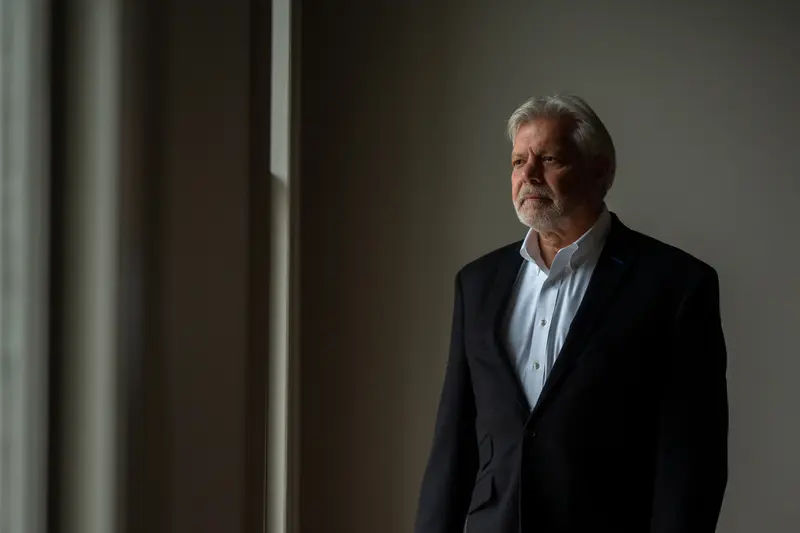
“There isn’t a judge in Jefferson Parish who’s going to find in favor of a defendant that says, ‘I wasn’t resisting,’ if the cop says he was resisting,” Bizal said. “And the judges know that if they convict the guy, it kills the civil case. The system’s stacked against you every way you turn.”
In many cases, defendants themselves ensure this outcome by striking a plea deal to avoid significant prison time.
In February 2019, New Orleans resident Orlin Lewis led deputies on a high-speed chase in a stolen car. When his vehicle crashed, Lewis jumped out and attempted to run. The official police report states that when Detective Broussard chased him down and tackled him, Lewis punched the detective several times. Broussard used “several closed fist strikes” to subdue him, then arrested him for resisting police by force or violence, among other offenses, according to the report.
Lewis ended up in the hospital to be treated for multiple facial fractures. Broussard and other deputies on the scene said medical staff told them it was possible the injuries occurred when his vehicle crashed and his head hit the steering wheel. In his lawsuit, Lewis acknowledged he had tried to run away but insisted that the rest of the deputies’ story was pure fiction. After a brief foot chase, Lewis said he realized escape was impossible, so he stopped, lay facedown on the street and surrendered. But instead of simply arresting him, Lewis said Broussard — the same detective who less than a month later would be caught on video slapping Cage’s phone out of his hand and giving him the finger — lifted Lewis to his knees, unholstered a gun and pistol-whipped him, striking him in the face. That’s what caused his injuries, Lewis said.
The Sheriff’s Office denied these allegations in court filings and said the actions were “reasonable under the circumstances.”
Bizal also claimed in the suit that Broussard and his fellow deputies falsified a police report in which they painted Lewis as the aggressor. Their “goal was to cover up their excessive use of force on Lewis and to justify his bodily injuries thereby denying him his right to recover damages for violation of his civil rights.”
Whether or not that was their goal, that’s exactly what happened.
Prosecutors agreed to reduce an armed robbery charge to simple robbery if Lewis pleaded guilty. Under Heck, he still could have filed suit, since his allegations of excessive force hinged on whether he resisted the police. However, as part of the deal, he also pleaded guilty to the resisting arrest charge, which meant he could no longer sue.
“Even if a police report is a total lie, it doesn’t matter, because so long as there’s a conviction, it erases the sins of those lies,” said Ahmed, the legal director at the ACLU of Louisiana.
In Louisiana, protections for the police don’t end there. The state is one of just three — the others being Kentucky and Tennessee — that impose a one-year deadline on filing federal civil rights lawsuits. The national average for these limits is just under three years, with states such as Maine and North Dakota going as high as six.
Defense attorneys typically caution their clients against suing the police until their criminal case is resolved, which often takes more than a year. So, even if a police department can’t secure a conviction, they can do their best to run out the clock to avoid civil liability another way.
In their analysis, the news organizations identified 372 cover-charge-only cases — about 3 out of every 4 — that did not resolve within a year of the offense.
The ACLU of Louisiana is currently challenging the statute of limitations in court, using an incident in which a man tried to sue after deputies in a jail allegedly broke his nose and eye socket, leaving him barely conscious. A DeSoto Parish deputy nodded yes when asked by a state trooper if the man, Jarius Brown, had resisted, according to the trooper’s body camera footage. Brown, traumatized, injured and struggling with court fines and fees, didn’t bring his suit until after a year had passed.
“We’re talking about atrocious beatings that are happening in Louisiana and [victims] have nowhere to go because they miss that deadline,” said Ahmed. “Providing a window of just 12 short months to file a federal civil rights suit before locking the courthouse doors denies people the opportunity to seek justice and has the effect of shielding police officers from being held accountable for their actions.”
These policies that protect the police are particularly meaningful in Jefferson Parish, where the Sheriff’s Office is answerable to no authority except the voters. One former sheriff described the position as “the closest thing there is to being a king in the U.S.”
Critics contend that the other levers of accountability — complaints to the Louisiana Board of Ethics and internal affairs divisions, and criminal prosecutions — have proven to be all but worthless.
As a result, lawsuits matter and are seen by many members of the Black community as the last available means by which to hold the Sheriff’s Office accountable.
Since 2013, nearly twice as many lawsuits alleging wrongdoing by deputies have been filed against the Jefferson Parish Sheriff’s Office as against the larger New Orleans Police Department. And yet, of the 198 lawsuits filed against the Sheriff’s Office, only 23 resulted in settlements, the largest of which was $88,350. Three-fourths of the plaintiffs in the Jefferson Parish lawsuits were Black, and more than half of those settlements included allegations of cover charges.
In one of those, from 2012, an 18-year-old woman tried to call her grandmother as officers searched her and a friend for marijuana; a deputy allegedly slammed her into the ground, breaking three vertebrae. Another settlement resulted from an incident two years later, when a deputy allegedly slammed a pregnant woman into a patrol car as she tried to call 911 after an accident; she ended up giving birth to her stillborn fetus in jail later that night. Both women were charged with resisting arrest.
Before his election, Sheriff Joseph Lopinto worked as a private attorney and represented the Sheriff’s Office in both cases. He described the deputies’ actions in court filings as “reasonable and appropriate under the circumstances.”
Years later, in response to another cover charge incident, Lopinto made a rare concession and publicly criticized his deputies, who were caught on video attacking Cage at the Mardi Gras parade. “There is no way to justify that,” he told reporters. “It was unprofessional.”
Even then, his office didn’t back down. Despite the video exonerating Cage, the Sheriff’s Office forwarded the resisting arrest and battery of an officer charges to the district attorney’s office for prosecution. Then, after Cage sued, the Sheriff’s Office attempted to use the false charges to push him to accept a lower settlement, Haedicke, Cage’s lawyer, said.
“I’m sure they have used that tactic in many situations,” said Haedicke, who rejected the offer.
The sheriff also promised disciplinary action, but only Broussard was punished, receiving a three-day suspension, said Haedicke. There is no indication that Dowling — who was previously fired from a nearby sheriff’s office for “violating policies and procedures” — faced any repercussions.
Twenty-one months after Cage was arrested, the district attorney dropped all charges, and 10 months after that, this October, the Sheriff’s Office settled Cage’s lawsuit for $40,000, according to records provided by the Sheriff’s Office.
Did he feel like justice had been served? “No,” Cage said, “because you can’t really take away that trauma.”
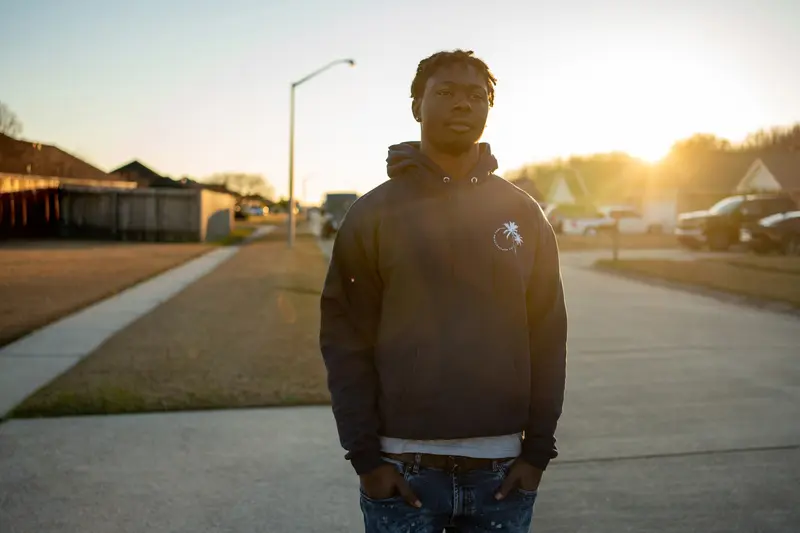
About the Data: How We Analyzed Cover Charges
Through a public records request, WWNO/WRKF and ProPublica obtained data on all charges filed in Jefferson Parish’s three courts: the First and Second parish courts and the 24th Judicial Court.The courts were helpful in providing the records but charged the news organizations $1,428.04 for the information. The data includes charges filed between Jan. 1, 2018, and March 31, 2021. The records include information about the charge statute, the date of the offense, the status or outcome of the case, and the race of the defendant. The data includes arrests made by Jefferson Parish Sheriff’s Office as well as other local law enforcement agencies. Because information on the arresting agency was very incomplete, the analysis could not disaggregate cover charges by law enforcement agency.
WWNO/WRKF and ProPublica defined cover charges as “resisting an officer,” “battery of a police officer,” “flight from a police officer” and “resisting an officer by force/violence.” Any arrest in which one of these charges appears alone or in combination exclusively with other cover charges is considered a cover-charge-only arrest.
Multiple charges were grouped together into a single arrest if the charges shared the same first name, last name and offense date. Arrests that include multiple charges usually share a case number, but we found many instances of charges for the same person from the same date filed under different case numbers. Less than 6% of charges in the data were missing the date of the offense. These were not included in our analysis. We noticed other small inconsistencies, such as a missing initial or a race recorded differently for the same person on two charges. We checked that such scenarios were not causing us to label an arrest as “cover charge only” when that was not the case. We also excluded arrests from our cover-charge-only group if there were any non-cover charges that shared the same case number, even if they were for someone with a different name.
Some cover charges appeared in the data with the case type marked as “driving while intoxicated.” In order to arrive at a conservative undercount of cover charges, those were not considered cover charges in our analysis. If a cover charge appeared in conjunction with any charges stemming from DWIs, accidents or traffic violations, it was not considered a cover-charge-only incident. Police interactions that consisted only of traffic, accident or DWI charges were excluded from the analysis.
Any cover-charge-only arrest that ended in a guilty plea or finding was included in our analysis of guilty outcomes, regardless of when the offense occurred or how long it took for the case to resolve. Case statuses and outcomes were current as of early November 2021, when the data was exported from the court records system. Therefore, when looking at cover-charge-only arrests that took longer than a year to resolve, we only considered charges with an offense date a year or more prior — so before November 2020. Some charges took over a year to resolve and then ended with a guilty plea or finding. Those cases are included both in our count of arrests with a guilty plea or finding and in our count of arrests that took more than a year to resolve, since both the guilty outcome and slow resolution impacted defendants’ ability to bring a lawsuit, had they wanted to.
